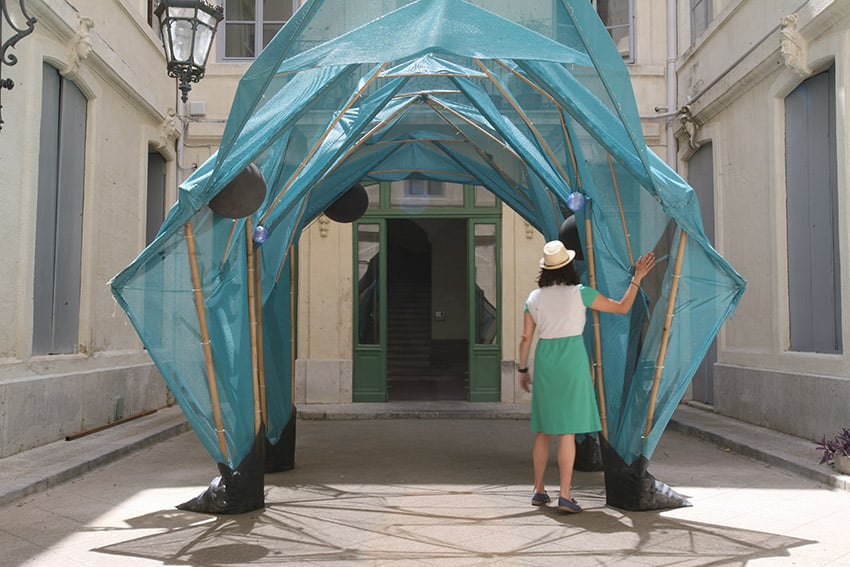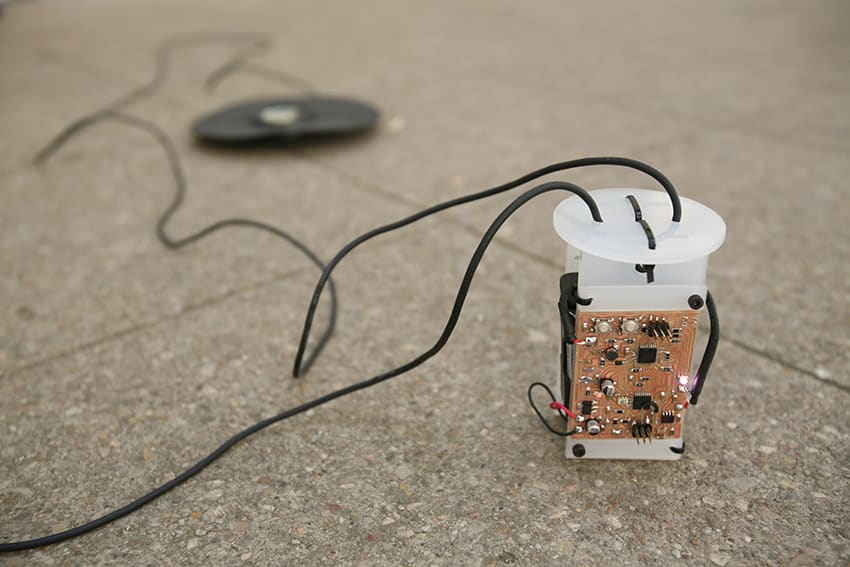The IaaC installation, developed in the occasion of the Festival des Architectures Vives 2014 in Montpellier, proposes to create a space within space, a pavilion in a courtyard, to enhance the intimacy and privacy suggested by the existing courtyard, opened to the public exclusively for the festival itself. The pavilion is a textile construction, generated through the use of the least possible structural elements, floating in equilibrium like a sheet strewn in the wind. The structure is lightweight and collapsable, designed and built by students in the framework of the Experimental Structures academic course in the Masters in Advanced Architecture course. When installed in the courtyard, the pavilion develops its interactive potential through a sensoral experience. Entering this new living space in the courtyard and touching the fabric walls, the courtyard takes life under the form of a soundscape from the outside world. The textile structure reacts to the users incorporating the senses of sight, touch and hearing, finally evoking a diverse reality.
[ic_end_intro]
THE STRUCTURE
The construction is made out of wooden beams and fabric. The fabric is light and removable, it touches the floor on four points. The 72m2 textile membrane is a special fabric for facades (Stamisol FT Serge Ferrari. The 35 wooden beams provide stiffness only at points where the structure requires support compression.
THE VISITOR EXPERIENCE
A space inside a space. Intimacy. Architecture considered as something that is alive and interactive, closer to a person’s everyday life. You feel the materiality as you move closer, and understand the structure, the architecture, while touching the soft textile, that in turn reacts with sound. A sensorial experience implemented through touch and sound, and generating a new, and more personal, soundscape.
THE TECHNOLOGY
The technology implemented into the structure itself is based on a custom board called TOMO developed in the Fab Lab Barcelona. TOMO is an standalone touch and sound processors, integrating two Arduino processors, one running a to touch detection algorithm based on the Touché principle (developed by Disney Research 2012) and the other dedicated to sound generation. The system is completely standalone and can be deployed on any structure, running on batteries for more than a week.
The initial pavilion developed in the Experimental Structures seminar has been hacked with conductive paint and two TOMO boards, and implemented with balloon speakers to create an intimate and vivid space, finally unfolding senses.
Design Team:
IAAC – Institute for Advanced Architecture of Catalonia / MAA01 12-13 – Program Director: Areti Markopoulou / Experimental Structure Seminar – Tutors: Silvia Brandi, Josep Miàs / Students: Ibrahim Berkay, Zeynep Birgönül, Harsh Boghani, Elif Gungor, Marjan Jelveh, Kismir Selcuk, Anand Singh, Angeliki Terezaki.
Interaction Team:
IAAC – Institute for Advanced Architecture of Catalonia / Guillem Camprodon, Alexander Dubor, Luis Fraguada, Clemens Niemeyer
Production Team:
IAAC – Institute for Advanced Architecture of Catalonia / Rodrigo Aguirre, Karen Beyens, Anastasia Pistofidou, Anna Popova
Partners:
Serge Ferrari http://es.sergeferrari.com/
FabLab Barcelona www.fablabbcn.org
EASTN – European Arts Science and Technology Network http://www.eastn.eu


